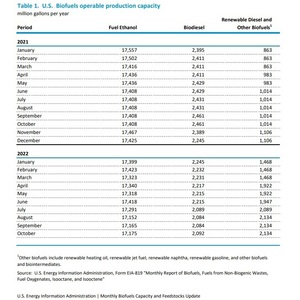EIA: Biofuel capacity, feedstock consumption up in October

January 5, 2023
BY Erin Krueger
U.S. operatable biofuel production capacity increased slightly in October according to data released by the U.S. Energy Information Administration on Dec. 30. Total feedstock use was up from the previous month, but down from October 2021.
Total U.S. biofuels capacity reached 21.401 billion gallons per year in October, up 18 MMgy when compared to September, with gains for both ethanol and biodiesel. When compared to the same month of 2021, total biofuels capacity was up 518 MMgy.
Ethanol production capacity was at 17.175 billion gallons per year in October, up 10 MMgy when compared to the previous month, but down 233 MMgy when compared to October 2021.
Biodiesel production capacity was at 2.092 billion gallons per year in October, up 8 MMgy when compared to September, but down 369 MMgy when compared the same month of the previous year.
Capacity for renewable diesel and associated fuels, including renewable heating oil, renewable jet fuel, renewable naphtha, renewable gasoline, and other biofuels and biointermediates, was at 2.134 billion gallons per year in October, flat with the previous month, but up 1.12 billion gallons per year when compared to October 2021.
Advertisement
Advertisement
U.S. biofuel producers consumed approximately 27.51 billion pounds of feedstock in October, up from 23.958 billion pounds the previous month, but down from 28.077 billion pounds in October 2021.
A total of 25.145 billion pounds of corn went to biofuel production in October, up from 21.473 billion pounds the previous month, but down from 26.205 billion pounds in October 2021. Approximately 328 million pounds of grain sorghum was used to produce biofuels in October, down from 408 million pounds in September, but up from 69 million pounds in October of the previous year.
Biofuel producers consumed 906 million pounds of soybean oil in October, down from 934 million pounds the previous month, but up from when compared to the 832 million pounds consumed in October 2021. Corn oil consumption was at 238 million pounds in October, down from 302 million pounds in September, but up from 217 million pounds in October of the previous year. Canola oil consumption expanded to 166 million pounds in October, up from 131 million pounds in September and 116 million pounds in October 2021.
Biofuel producers also consumed 464 million pounds of yellow grease, 127 million pounds of beef tallow, 61 million pounds of white grease and 16 million pounds of poultry fat in October, compared to 438 million pounds, 131 million pounds, 62 million pounds, and 13 million pounds, respectively, in September, and 321 million pounds, 141 million pounds, 67 million pounds, and 15 million pounds, respectively, in October 2021.
Advertisement
Advertisement
In addition, biofuel producers consumed 59 million pounds of feedstock classified as “other” recycled feeds and wastes in October, down from 66 million pounds the previous month and 64 million pounds in October of the previous year. The EIA withheld data on yard and food waste feedstocks and feedstocks classified as “other” for October to avoid disclosure of individual company data.
Additional data is available on the EIA website.
Related Stories
The USDA significantly increased its estimate for 2025-’26 soybean oil use in biofuel production in its latest World Agricultural Supply and Demand Estimates report, released July 11. The outlook for soybean production was revised down.
The U.S. Energy Information Administration maintained its forecast for 2025 and 2026 biodiesel, renewable diesel and sustainable aviation fuel (SAF) production in its latest Short-Term Energy Outlook, released July 8.
XCF Global Inc. on July 10 shared its strategic plan to invest close to $1 billion in developing a network of SAF production facilities, expanding its U.S. footprint, and advancing its international growth strategy.
U.S. fuel ethanol capacity fell slightly in April, while biodiesel and renewable diesel capacity held steady, according to data released by the U.S. EIA on June 30. Feedstock consumption was down when compared to the previous month.
XCF Global Inc. on July 8 provided a production update on its flagship New Rise Reno facility, underscoring that the plant has successfully produced SAF, renewable diesel, and renewable naphtha during its initial ramp-up.
Upcoming Events










